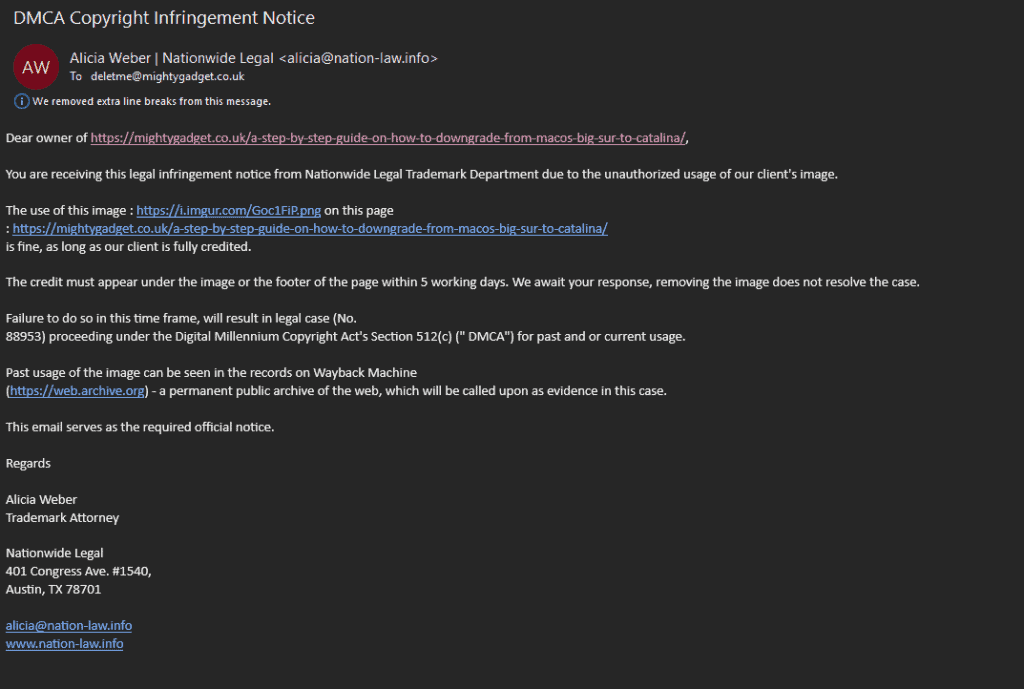Any links to online stores should be assumed to be affiliates. The company or PR agency provides all or most review samples. They have no control over my content, and I provide my honest opinion.
Fake DMCA infringement notices are among the most annoying forms of spam link-building emails that I get.
Genuine DMCA Claims
If you have ever published content online, you will be aware you can’t use any old images you find online. In my early career, when I was running a web development company, someone, possibly me, had used a Shutterstock (or similar) image on a client site.
Some months after the site went live, we received a DMCA notice with a demand for a reasonably large amount of money. These companies don’t mess about, and you can’t just remove the image and hope it will resolve the case.
If you ignore the claim, they will happily pass it over to a collection agency. The solution in these cases appears to accept that you owe the money or use a solicitor to help you respond that is specialised in “Intellectual Property” or “Copyright”.
It is very predatory as they seem to target small companies knowing that they can extort them, but at the end of the day, it is still an infringement on copyright.
This, therefore, makes publishers like myself paranoid about accidentally posting copyrighted content and getting caught out with one of these DMCA claims.
Since then, I have always done my best to use stock images from companies like Pexels, Pixabay and Unsplash, which are free to use and require no attribution to the original author.
I have posted a lot of content over the years, and I will often rename images with a sensible name for what the image contains or what the post is about. It is good practice, and it also allows me to reuse photos just by searching for keywords it in my WordPress media library.
Nowadays, I typically try and leave some sort of reference to know where I sourced that image from. However, in the past, I didn’t think anything about it.
Fake DMCA Claims
Unfortunately, nefarious companies try and exploit this vulnerability by faking DMCA notices. They will select an image from a free stock photo site, knowing the publisher has likely not attributed the image and certainly not paid for it.
They will use some similar threats from official notices, such as removing the image does not resolve the problem.
The big difference is that instead of demanding money, they will demand that you must credit the author with a link back to the website.
Sometimes the DMCA notice will include information on the client link in the original email. These are normally easy to identify as fake because they will want a keyword-rich link back to some random website.
Others, including the ones I have received recently, don’t specify the exact link, so it is a bit harder to work out if it is authentic or not.
And this is why I hate these emails so much. Once or twice a year, I will get one, and it looks authentic, then, I will look at the image, and it will be one that I haven’t added some easy-to-use reference to work out where it is from. I, therefore, panic, wondering where it is from and if it might be copyrighted.
Nationwide Legal

Nationwide Legal is one of the companies that has started to spam me with these types of notices.
They have a reputation, and I should have Googled the company name + DMCA before panicking. It looks like they are ramping up their notices, so I am writing this post to hopefully help anyone that may get caught out.
The first email I got from them was for an image I hadn’t left a reference one. The second one literally had Pixabay in the file name.
The email looks semi-professional and has links going back to the website nation-law.info. However, if you Google other experiences of these claims, the domain has changed a lot, presumably because the hosts take down the website due to the fraudulent nature of their activities.
My recent DMA notices come from alicia@nation-law.info
Alicia Weber is apparently a Trademark Attorney with Nationwide Legal being located at 401 Congress Ave. #1540, Austin, TX 78701
The email states:
Dear owner of https://mightygadget.co.uk/a-step-by-step-guide-on-how-to-downgrade-from-macos-big-sur-to-catalina/,
You are receiving this legal infringement notice from Nationwide
Legal Trademark Department due to the unauthorized usage of our client’s
image.
The use of this image : https://i.imgur.com/Goc1FiP.png on this page
: https://mightygadget.co.uk/a-step-by-step-guide-on-how-to-downgrade-from-macos-big-sur-to-catalina/
is fine, as long as our client is fully credited.
The credit must appear under the image or the footer of the page
within 5 working days. We await your response, removing the image does not
resolve the case.
Failure to do so in this time frame, will result in legal case (No.
88953) proceeding under the Digital Millennium Copyright Act’s Section 512(c)
(” DMCA”) for past and or current usage.
Past usage of the image can be seen in the records on Wayback Machine
(https://web.archive.org) – a permanent public archive of the web, which
will be called upon as evidence in this case.
This email serves as the required official notice.
Quite a lot of companies get caught out by this scam, some of which a well known. Again, another reason to write this post. Many other people have written about Nationwide Legal, but the more awareness about this scam, the better.
Do not reply to fake DMCA notices.
Generally, the recommended course of action is just not to reply. I stupidly replied to the first email from them, and it hasn’t stopped them from trying to make another claim against me.
I am James, a UK-based tech enthusiast and the Editor and Owner of Mighty Gadget, which I’ve proudly run since 2007. Passionate about all things technology, my expertise spans from computers and networking to mobile, wearables, and smart home devices.
As a fitness fanatic who loves running and cycling, I also have a keen interest in fitness-related technology, and I take every opportunity to cover this niche on my blog. My diverse interests allow me to bring a unique perspective to tech blogging, merging lifestyle, fitness, and the latest tech trends.
In my academic pursuits, I earned a BSc in Information Systems Design from UCLAN, before advancing my learning with a Master’s Degree in Computing. This advanced study also included Cisco CCNA accreditation, further demonstrating my commitment to understanding and staying ahead of the technology curve.
I’m proud to share that Vuelio has consistently ranked Mighty Gadget as one of the top technology blogs in the UK. With my dedication to technology and drive to share my insights, I aim to continue providing my readers with engaging and informative content.






